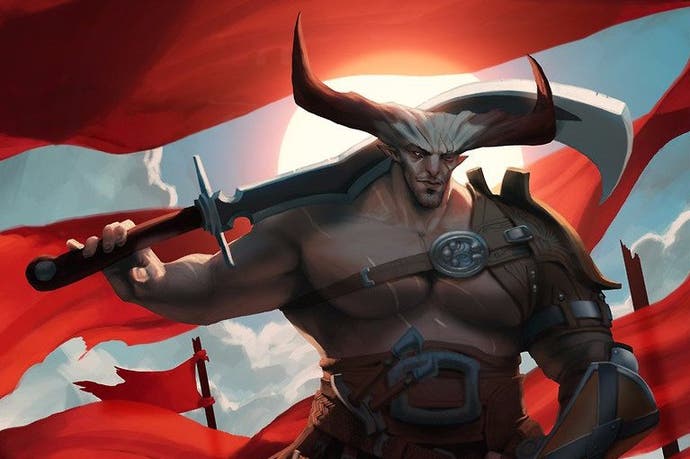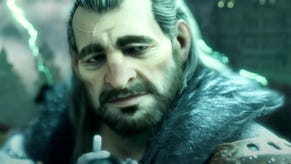Shards, side-quests and DLC: a mini-Inquisition with the boss of Dragon Age
"'Doctor, it hurts when I do this'. So don't do this!"
Dragon Age: Inquisition marked a return to form for BioWare's epic fantasy series, with critical acclaim both at its launch and during the end of year awards season, when the role-player received numerous Game of the Year gongs.
But despite being loved by both critics and fans - to the extent that it became BioWare's fastest-selling launch of all time - Inquisition undoubtedly also contains a number of flaws. Its biggest, perhaps, is its Ubisoft-style focus on side-content, where it hands players map upon map of collectables to hoover up in order to complete quests.
Inquisition expands the series' scope for exploration by gifting players huge areas of wilderness to explore - but some areas are more interesting than others. Finally, fans have also spotted a number of missing gameplay features, shown in earlier builds of the game but that didn't make it into the final release.
Now, in a new interview with Eurogamer held at EGX Rezzed 2015, Dragon Age's creative director Mike Laidlaw has responded to these criticisms - and even hinted at what players should expect from the game's much-anticipated upcoming DLC.
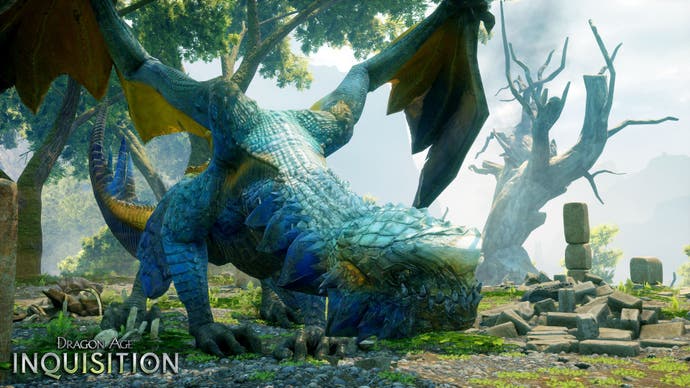
"It's hard to understate how validating the critical response has been to the team," Laidlaw begins, explaining the challenges BioWare had needed to face. "We had a bit of a misstep with Dragon Age 2, we were moving to a new engine, we had to contend with five platforms... There were a lot of hurdles, but seeing people respond to it has been one of the best feelings."
The game's Metacritic average sits on 89, but there's a hint of disappointment in Laidlaw's voice when I ask how this compares to expectations.
"You're always hoping for the 90. It's the gold number in the Metacritic world. But the scale of reviewing has spread out some - I used to see back in the day that anything lower than 80 per cent was basically unheard of. So we've seen the numbers come down. Sites are evaluating the game fairly.
"We're not at the point where we thought the game was a perfect gem," he continues. "A lot of RPGs are not - they are big and unwieldy. But seeing it in the 90 range makes me quite pleased."
Laidlaw says he has seen the complaints from fans about the number of collectable side-quests and "doesn't disagree".
But, he argues, there is no need for players to actually complete all of those quests, just because they are in the game. And there isn't, technically, in that they are not required to trigger a perfect ending or even reach the end at all. But then again, they are there...
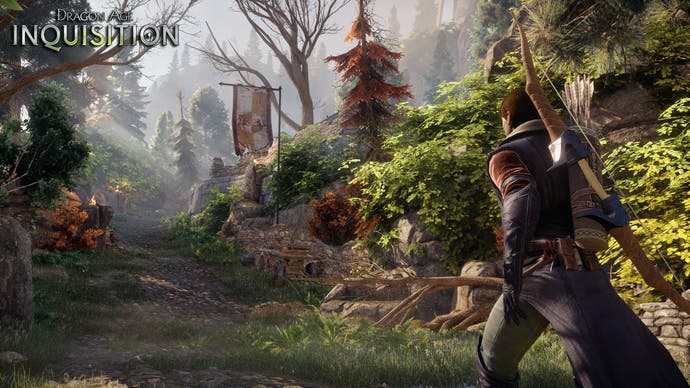
"Dragon Age: Origins and DA2 had heavy blocks of story followed immediately by heavy blocks of story," Laidlaw says, explaining why the collectables exist. "When we looked at what Frostbite could offer to us we realised we could build these bigger areas and interrupt that flow. So we built these lighter, side-exploration areas, but we built them as places where you could choose what stuff to do to enhance the story.
"One of things that I think was a miscalibration is a lot of players wanting to do all of it - even to the point where they say 'I'm bored of collecting shards'. But they want them all because they're there. It's almost like a compulsive need. It's almost like 'Doctor, it hurts when I do this'. So don't do this!"
Inquisition's shard collectables cover each area of the game and contribute to a major side-quest, where you progressively unlock new areas of an underground temple. Collecting all of the shards in a particular area will also reward you with dollops of XP, while clearing wings of the temple awards progressively higher amounts of elemental resistance, and culminates in a particularly difficult boss fight.
"There's more XP and money in the game than you need to win. But it's a good insight for us, and something as a team we've been discussing. Myself, while those areas thematically tie into the Inquisition, what people were hoping for is they had more meaty story content built into them.
"So while the [starting area] Hinterlands had fetch quests it also had other things to do to enhance that zone, but in other lighter places people have said they weren't really feeling them as much. That becomes another data point, and a huge opportunity for the game to grow, presuming we move into something in the future."
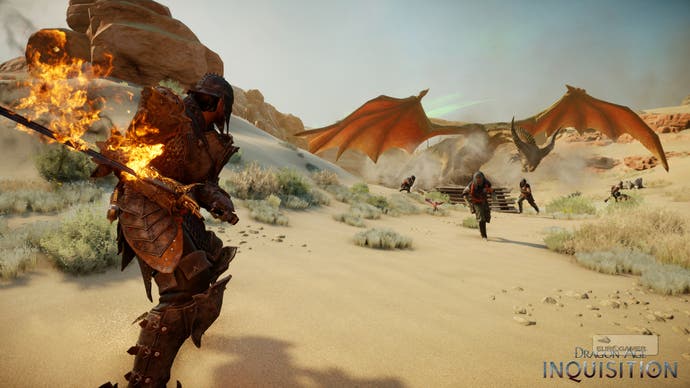
Turning to Inquisition's improvements from Dragon Age 2, Laidlaw is more blunt.
"Well we now have more than one cave," he jokes, referencing BioWare's repeated re-use of dungeon layouts in the earlier game. "If you reduce the criticism that is basically what it was. Assets get re-used all in the time in games but, in DA2 they were re-used clumsily.
"[For Inquisition] we were staring at an engine that can build multiple-kilometre zones on either side - big enough for fighter jets - so we thought, jeez, this will allow us to put that to bed. The other thing was, DA2 was a bit of an art-house piece. Origins was a big save the world thing, DA2 was more personal, more of a tragedy than a comedy, where bad things happened to Hawke even as he was successful. DA2 missed the high stakes but I liked a lot of the things it accomplished. That pushed us towards doing something bigger again, something that matched the spaces we were creating."
BioWare followed Dragon Age 2 with the launch of Mass Effect 3, whose release and critical acclaim were quickly overshadowed by the controversy surrounding its ending. So when BioWare came to Inquisition, its development was a critical moment for both the Dragon Age franchise and the studio itself.
"We owed it to ourselves," Laidlaw says. "It's important to us as a studio to feel like we've always done our best, and to maintain a culture of excellence. With Inquisition we were sensitive to that situation [post DA2 and ME3]. But even if the situation had been different, the amount of challenges and opportunities we had to deal with remained. Regardless of the background, BioWare is dedicated to delivering for all players - for fans, and for people whose first Dragon Age game is Inquisition.
"We wanted Inquisition to be the one which people would point to and say, 'they've found their feet. They've finally nailed down what this series is about.' Not that this locks us down or shackles us in any way, it just makes a clear statement on the priorities."
One problem the team did have to tackle was maintaining Inquisition's simultaneous development across five platforms, including two console generations.
"We established fairly early on we would maintain gameplay parity. Visually, obviously, we knew there would be differences - if there wasn't then we'd have severely missed our mark. PC is a powerhouse now, PS4 and Xbox One have the benefit of a decade of hardware development." The PS3 and Xbox 360 in comparison have "memory limitations", Laidlaw continues, but sometimes the limitations lead to new ideas.
"Yes we could have had more enemies on screen, but instead we were able to think about how we could have enemies that work together - buffing each other, for example. Was there a potential for us, if we went beyond Gen 3, to go further? Sure, but we have to build a game that we are able to ship in the box."
Sections of the game were adjusted as a result, as it became clear that some ideas were not going to work as originally planned. A version of the game demoed at PAX Prime in 2013, around a year before the game's final release, showed hints of a war simulation system, where players would have to focus on building up and maintaining military strength around their captured keeps.
"We had to do some changes," Laidlaw admits. "That was something where we had a good working prototype but we hit a snag due to the technical limitations on it. Having multiple forces fighting works fine on PC but you end up in a situation where having realistic-feeling war on the older consoles is exceedingly challenging."
The game used to feature more environmental destruction, too, and a greater number of options for solving missions. Boats could be burnt and bridges collapsed to affect the strength of enemy forces. These items were cut based "a little bit [on the last-gen] platforms, a little bit about the flow of the gameplay," Laidlaw adds. "We didn't want to build a military campaign simulator and have one zone riddled with that but others that don't have keeps be different - we wanted a consistency across the game.
"So it was about recognising the things from playtests where we realise we can almost do something but it does fall down at a certain point. And we did reuse some of that - for example, when moving the trebuchets in Haven - so we didn't throw 100 per cent of the systems out.
"But do we have a hunger to revisit those systems and explore them? Absolutely. Environmental interaction adds a mental level to the game where you feel like the world is more responsive and aware of your actions - where you can, for example, accidentally set something on fire."
But, regardless of cuts, Inquisition was a success. So what does this mean for the franchise? "It certainly doesn't put it at risk," Laidlaw replies. "But I never count my chickens before they're hatched. I'll never say 'oh we're definitely doing something else'. I'd say it's possible there will be more Dragon Age - there's certainly no impediments to it. But first we have to finish the patch cycle and put out the [previously announced] Black Emporium update. We've also talked about multiplayer DLC - we've put out one pack and would like to do another."
BioWare has so far remained silent on its plans for new single-player expansions, and fans have been left to only guess as to what or when it may arrive. It's a welcome change from the situation a couple of years ago, when BioWare was hawking day-one Mass Effect 3 DLC to fans before the game released. The tactic was not well received, so a change of tack is unsurprising.
"It's interesting - it's very different to a few years ago!" Laidlaw says of the current fan demand for information. "I wouldn't say it's a conscious decision [to not talk about Inquisition's DLC] so much as us making sure anything we're working on is locked down before we talk about it," Laidlaw reasons. "I don't have anything official to announce but I'd say you won't have to wait too much longer."
And BioWare is well aware of what its fans want: a mix of more game areas and a healthy dose of new story - especially something that can expand upon Inquisition's post-game stinger.
"The two big pulls are - 'I want more of this game' and 'I've reached the ending and I want to know more about the characters, or one specific character'," Laidlaw says. "I don't want to go into too much detail but I'm well aware of both of those camps and I'd like to see both of those groups satisfied before we're done."
We won't spoil the post-credits scene here, but it sounds like BioWare is planning on telling at least a little more of that story sooner, rather than later.
"I think there's a desire for pursuing that a little further but it doesn't have to end that discussion. It's a bit of tightrope, and one that I can't possibly discuss - biggest spoilers in the universe! [But] it's something we're very cognisant of."
